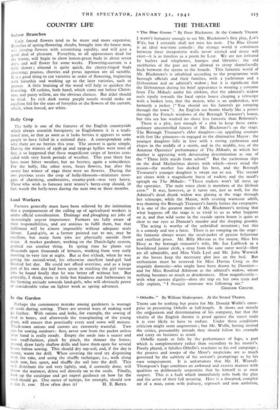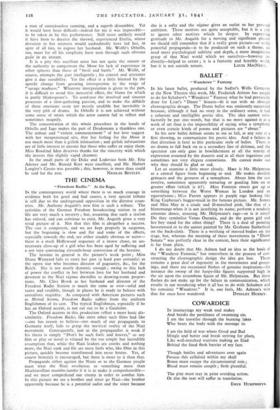" Othello." By William Shakespeare. At the Strand Theatre.
THERE can be nothing but praise for Mr. Donald Wolfit's enter- prise in- presenting Othello at full-length. It shows not merely the entinisiasm and determination of his company, but that the vitality of the English theatre is proof against the sorest trials it is ever likely to have to endure. Under these conditions criticism might seem ungenerous ; but Mr. Wolfit, having invited the critics, presumably intends they should follow his example and carry on business as usual.
Othello stands or falls by the performance of Iago, a part which is complementary rather than secondary to his master's. Poorly played, it falsifies Othello's reactions to his evil campaign ; the process and tempo of the Moor's suspicions are as much governed by the subtlety of his servant's promptings as by his own temperament. It is unfortunate that Mr. H. Worrall- Thompson's Iago combines an awkward and evasive manner with qualities so deliberately serpentine that he himself is at once suspect. This is a fault which immediately robs both the play and the actor of their full meaning. Here is a thwarted, complex rat of a man, eaten with jealousy, reproach and iron ambition, a man of consciousless cunning, and a superb dissembler. Yet it would have been difficult—indeed for me it was impossible— to be taken in by this performance. Still more unlikely would it have been to deceive the shrewd, experienced Emilia, whose devotion to her mistress would undoubtedly have led her, in spite of all ties, to expose her husband. Mr. Won's Othello, too, must for all his simplicity have seen through such obvious guile in an instant.
It is a pity this excellent actor has not quite the stature or the authority to compensate the Moor for lack of experience in other spheres than those of "broil and battle." Mr. Wolfit, of course, attempts the part intelligently ; his control and utterance give it due sensibility. Yet the effect is a little blurred by the speedy change from gnawing introspection to the verge of "savage madness." Whatever interpretation is given to the part, it is difficult to avoid this mercurial effect, the blame for which is partly Shakespeare's. To condense the involved and sinuous processes of a slow-gathering passion, and to make the debacle of these emotions seem not merely credible but inevitable is the very pith of drama. In Othello it is not achieved without some sense of strain which the actor cannot fail to reflect and sometimes magnify.
The concentration of this whole procedure in the hands of Othello and Iago makes the part of Desdemona a thankless one. The ardour and "violent commencement" of her love suggest with her inexperienced airs, that her feeling for the Moor is not much more than a girlish infatuation ; and girlish infatuations are of little interest to anyone but those who suffer or enjoy them. Miss Rosalind Idea deserves thanks for the sincerity with which she invests this slightly vapid charmer.
In the small parts of the Duke and Lod.ovico both Mr. Eric Adeney and Mr. Ronald Kerr were excellent, and Mr. Hubert Langley's Cassio was passable ; this, however, is more than could































 Previous page
Previous page